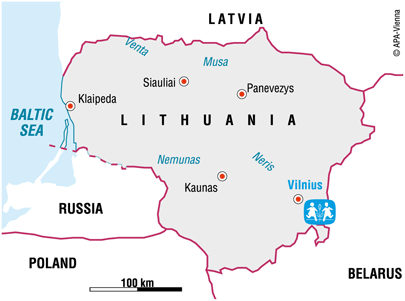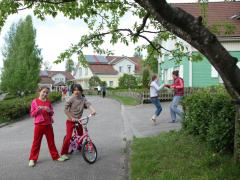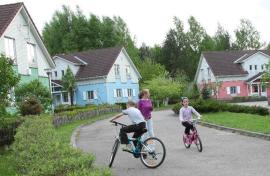
Vi er i Lithuania
The recent decades have seen many political changes
In 1991 Lithuania became a sovereign country, having declared itself independent from the former USSR.
Lithuania's economy is slowly recovering from the crisis
Lithuania has a variety of social problems to address. Organised crime and corruption continue to be a problem. Although violent crime has decreased in recent years, Lithuania still has one of the highest homicide rates in the European Union.
The provision of health care has improved since 1991, but there are still regional differences. Lithuania has got one of the lowest life expectancy rates within the European Union. Since becoming independent from the former USSR, Lithuania has had one of the highest suicide rates in the world.
Many Lithuanians have emigrated in search of a higher standard of living. According to national statistics, the population of Lithuania has fallen by about 180,000 since it joined the EU in 2004. The emigration of parents means that children are often placed in care institutions.
Children who are at risk need better protection
Children under the age of 18 account for 19 per cent of the population in Lithuania. The recent social, economic and political changes have worsened the situation for children in the country. In spite of a fall in population, the number of children at risk remains at around the same level. In 2014 about 1,600 families were raising over 2,700 children who were ar risk.
The violence found in Lithuanian society at large also affects children – children are often taken into care due to physical abuse. Unemployment and poverty have also forced some parents to place their children in care. Alcohol abuse is a real problem in Lithuania, particularly in rural areas.
At the end of 2014, about 9,900 children were in care, most of them are in families. A recent national audit concluded that the care system was inefficient and not working in the best interest of the children.

Children in rural areas are particularly disadvantages – there is a shortage of educational facilities, there is worse access to health care than in the cities and less support for families who need help.
SOS Children's Villages in Lithuania
Care in SOS families: Children who have lost parental care can find a loving home in SOS families in SOS Children's Village Vilnius. The children attend the nearby kindergartens and schools and take part in activities in their area. We work with the local schools and sports clubs so that children can receive a good education and enjoy their free time.
Supporting young people: The high unemployment rate and the shortage of affordable housing make it difficult for young people to become independent. The SOS Youth Programmes help young people gain further training and supports them while they look for work.
Summer camps: Every year, we organise summer camps in Karkle, on the Baltic coast. In 2014, nearly 680 children in care, and nearly 489 parents from foster families and our family strengthening programmes spent some time here. Young people in our care help to run the camp; it is an excellent opportunity for them to have fun and get some work experience.
Advocacy: We work closely with other care organisation and public authorities to raise awareness of children's rights.
Website of SOS Children's Villages Lithuania
(available in English and Lithuanian)
